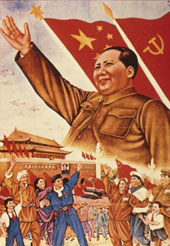|
|
| LONG MARCH: Mao Zedong had a most trusted comrade in Bapa Phuntso Wangye |
Bapa Phuntso Wangye had a dream for Tibet. The Tibet of his dream would be a modern society, where children would go to school and live and work as free people. Growing up in a primitive village in Kham, now partly in Sichuan province, he had seen too much of the inhuman feudal oppression of the common people to have much love lost for old Tibet. He next saw the Chinese oppressors when the officers of Chiang Kai-shek’s republican government matched the feudal lords in terrorising and torturing defenceless Tibetans.
Phunwang, as he is popularly known, realised early in life that his dream Tibet could come only the communist way. He must go to the Soviet Union, he decided, to train as a communist. He crossed into Sikkim and eventually landed in Calcutta to seek help from the then illegal Communist Party of India. Unsuccessful in his mission, he returned to Tibet. Mao Zedong’s Long March had begun and he lost no time in throwing his lot in with the communists. When the People’s Liberation Army of the new communist China advanced on Tibet in 1951 for its “peaceful liberation”, he was the first Tibetan communist leader to show the Reds the way into Lhasa. He became Mao’s ? and Zhou En-lai’s ? most trusted comrade in Tibet.
Then Phunwang’s world turned upside down. In 1960, he was arrested for upholding “local (read Tibetan) nationalism” and spent the next 18 years in a prison outside Beijing where he suffered unspeakable tortures. “Those were the mad days of the cultural revolution,” Phunwang recollects in his recently published autobiography. All this did not, however, destroy his faith in Marxism. Subsequently rehabilitated in the Chinese Communist Party, he became a deputy in the National People’s Congress and a deputy director in the Nationalities Commission of the Chinese Academy of Social Sciences. He lives in Beijing and now dreams of a Tibet where communism and the Dalai Lama can peacefully coexist.











